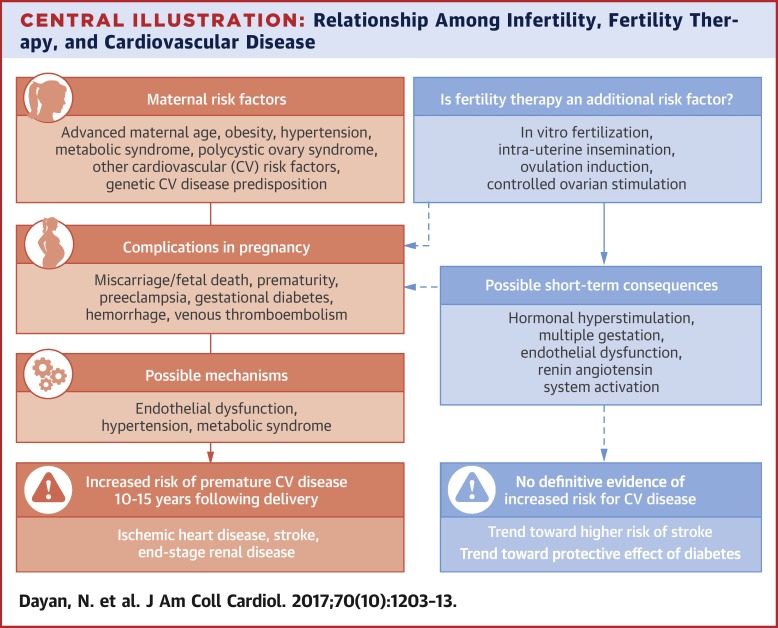当前位置:
X-MOL 学术
›
J. Am. Coll. Cardiol.
›
论文详情
Our official English website, www.x-mol.net, welcomes your feedback! (Note: you will need to create a separate account there.)
Cardiovascular Risk Following Fertility Therapy
Journal of the American College of Cardiology ( IF 24.0 ) Pub Date : 2017-09-01 , DOI: 10.1016/j.jacc.2017.07.753 Natalie Dayan , Kristian B. Filion , Marisa Okano , Caitlin Kilmartin , Shauna Reinblatt , Tara Landry , Olga Basso , Jacob A. Udell
Journal of the American College of Cardiology ( IF 24.0 ) Pub Date : 2017-09-01 , DOI: 10.1016/j.jacc.2017.07.753 Natalie Dayan , Kristian B. Filion , Marisa Okano , Caitlin Kilmartin , Shauna Reinblatt , Tara Landry , Olga Basso , Jacob A. Udell

|
BACKGROUND
The longer term cardiovascular effects of fertility therapy are unknown. OBJECTIVES
The aim of this study was to summarize data linking fertility therapy with subsequent cardiovascular outcomes. METHODS
We systematically searched published reports for studies addressing the question "does fertility therapy increase the risk of longer term cardiovascular outcomes?" We included: 1) human studies; 2) case control, cohort, or randomized designs with 3) exposure to fertility therapy and 4) cardiovascular outcomes clearly reported; 5) presence of comparison group; 6) minimum 1-year follow-up; and 7) adjustment for age. Two independent reviewers screened abstracts, titles, and full texts, and assessed study quality. We used the DerSimonian and Laird random-effects models to pool hazard ratios (HRs) with 95% confidence intervals (CIs) of the following outcomes: acute cardiac event; stroke; venous thromboembolism; hypertension; and diabetes mellitus, comparing women who received fertility therapy with those who did not. RESULTS
Six observational studies met inclusion criteria including 41,910 women who received fertility therapy and 1,400,202 women who did not. There was no increased risk of a cardiac event (pooled HR: 0.91; 95% CI: 0.67 to 1.25; I2 = 36.6%), or diabetes mellitus (pooled HR: 0.93; 95% CI: 0.87 to 1.001; I2 = 0%). Results were not pooled for hypertension (I2 = 95.0%) and venous thromboembolism (I2 = 82.3%). There was a trend toward higher risk of stroke (pooled HR: 1.25; 95% CI: 0.96 to 1.63; I2 = 0%). CONCLUSIONS
The small number of studies and significant heterogeneity precludes definitive reassurance about the longer term cardiovascular safety of these treatments, particularly stroke. Future studies are needed to address ongoing knowledge gaps in this area.
中文翻译:

生育治疗后的心血管风险
背景生育治疗的长期心血管效应尚不清楚。目的 本研究的目的是总结将生育治疗与随后的心血管结局联系起来的数据。方法我们系统地搜索了已发表的研究报告,以解决“生育治疗是否会增加长期心血管结局风险?”这一问题的研究。我们包括:1) 人体研究;2) 病例对照、队列或随机设计,3) 接受生育治疗和 4) 明确报告心血管结局;5) 对照组的存在;6) 至少1年的随访;7) 年龄调整。两名独立审稿人筛选摘要、标题和全文,并评估研究质量。我们使用 DerSimonian 和 Laird 随机效应模型将风险比 (HR) 与以下结果的 95% 置信区间 (CI) 合并:急性心脏事件;中风; 静脉血栓栓塞; 高血压; 和糖尿病,将接受生育治疗的女性与未接受生育治疗的女性进行比较。结果 六项观察性研究符合纳入标准,包括 41,910 名接受生育治疗的女性和 1,400,202 名未接受生育治疗的女性。心脏事件(汇总 HR:0.91;95% CI:0.67 至 1.25;I2 = 36.6%)或糖尿病(汇总 HR:0.93;95% CI:0.87 至 1.001;I2 = 0%)的风险没有增加)。结果没有合并高血压 (I2 = 95.0%) 和静脉血栓栓塞 (I2 = 82.3%)。存在卒中风险升高的趋势(汇总 HR:1.25;95% CI:0.96 至 1.63;I2 = 0%)。结论 少数研究和显着的异质性排除了对这些治疗的长期心血管安全性的明确保证,特别是中风。未来的研究需要解决该领域持续存在的知识差距。
更新日期:2017-09-01
中文翻译:

生育治疗后的心血管风险
背景生育治疗的长期心血管效应尚不清楚。目的 本研究的目的是总结将生育治疗与随后的心血管结局联系起来的数据。方法我们系统地搜索了已发表的研究报告,以解决“生育治疗是否会增加长期心血管结局风险?”这一问题的研究。我们包括:1) 人体研究;2) 病例对照、队列或随机设计,3) 接受生育治疗和 4) 明确报告心血管结局;5) 对照组的存在;6) 至少1年的随访;7) 年龄调整。两名独立审稿人筛选摘要、标题和全文,并评估研究质量。我们使用 DerSimonian 和 Laird 随机效应模型将风险比 (HR) 与以下结果的 95% 置信区间 (CI) 合并:急性心脏事件;中风; 静脉血栓栓塞; 高血压; 和糖尿病,将接受生育治疗的女性与未接受生育治疗的女性进行比较。结果 六项观察性研究符合纳入标准,包括 41,910 名接受生育治疗的女性和 1,400,202 名未接受生育治疗的女性。心脏事件(汇总 HR:0.91;95% CI:0.67 至 1.25;I2 = 36.6%)或糖尿病(汇总 HR:0.93;95% CI:0.87 至 1.001;I2 = 0%)的风险没有增加)。结果没有合并高血压 (I2 = 95.0%) 和静脉血栓栓塞 (I2 = 82.3%)。存在卒中风险升高的趋势(汇总 HR:1.25;95% CI:0.96 至 1.63;I2 = 0%)。结论 少数研究和显着的异质性排除了对这些治疗的长期心血管安全性的明确保证,特别是中风。未来的研究需要解决该领域持续存在的知识差距。



























 京公网安备 11010802027423号
京公网安备 11010802027423号